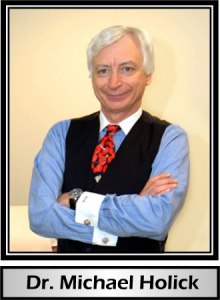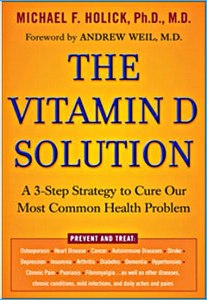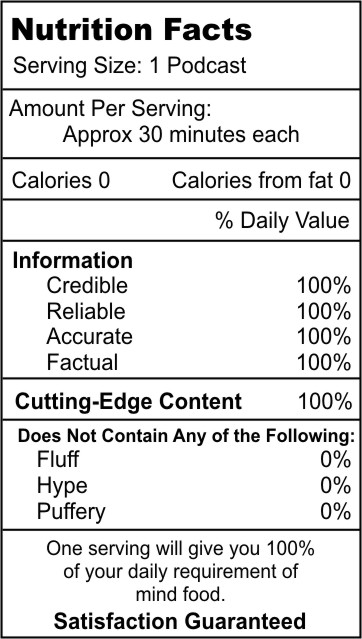Podcast: Play in new window | Download (Duration: 31:01 — 56.9MB)
Vitamin D is crucial throughout life.
 Vitamin D is not a vitamin but a hormone. It is unique in that it is made in the skin as a result of exposure to sunlight. Photosynthesis of vitamin D has been occurring on earth for more than 750 million years. Some of the earliest life forms that were exposed to sunlight for their energy requirement were also photosynthesizing vitamin D. Both children and adults have in the past depended on adequate sun exposure to satisfy their vitamin D requirement. It is well documented that at the turn of the last century upwards of 80% of children in the industrialized, polluted cities of northern Europe and northeastern United States suffered from the devastating consequences of vitamin D deficiency rickets. The skin has a large capacity to make vitamin D. Exposure of a person in a bathing suit to a minimal dose of sunlight, which is typically no more than 15-20 minutes on Cape Cod in June or July at noon time, is the equivalent to taking 20,000 IU of vitamin D orally. It is now well documented that in the absence of any sun exposure 1,000 IU of vitamin D3 a day is necessary to maintain healthy levels of vitamin D in the circulation. An analysis of recent data has demonstrated that neither children nor adults are receiving an adequate amount of vitamin D from their diet or from supplements. from The Vitamin D Solution
Vitamin D is not a vitamin but a hormone. It is unique in that it is made in the skin as a result of exposure to sunlight. Photosynthesis of vitamin D has been occurring on earth for more than 750 million years. Some of the earliest life forms that were exposed to sunlight for their energy requirement were also photosynthesizing vitamin D. Both children and adults have in the past depended on adequate sun exposure to satisfy their vitamin D requirement. It is well documented that at the turn of the last century upwards of 80% of children in the industrialized, polluted cities of northern Europe and northeastern United States suffered from the devastating consequences of vitamin D deficiency rickets. The skin has a large capacity to make vitamin D. Exposure of a person in a bathing suit to a minimal dose of sunlight, which is typically no more than 15-20 minutes on Cape Cod in June or July at noon time, is the equivalent to taking 20,000 IU of vitamin D orally. It is now well documented that in the absence of any sun exposure 1,000 IU of vitamin D3 a day is necessary to maintain healthy levels of vitamin D in the circulation. An analysis of recent data has demonstrated that neither children nor adults are receiving an adequate amount of vitamin D from their diet or from supplements. from The Vitamin D Solution
 In this interview Dr. Holick discusses some of the very important health benefits of vitamin D. The basic fact is that we do not get enough sun exposure to give us optimal amounts of vitamin D. The good news is that it is very easy, and very inexpensive as a supplement. There is no reason not to get adequate vitamin D. There are vitamin D drops and chewables for those who don’t swallow capsules. Just be sure to get vitamin D3 and not vitamin D2. Vitamin D3 is the form that is found in the body.
In this interview Dr. Holick discusses some of the very important health benefits of vitamin D. The basic fact is that we do not get enough sun exposure to give us optimal amounts of vitamin D. The good news is that it is very easy, and very inexpensive as a supplement. There is no reason not to get adequate vitamin D. There are vitamin D drops and chewables for those who don’t swallow capsules. Just be sure to get vitamin D3 and not vitamin D2. Vitamin D3 is the form that is found in the body.
About Dr. Holick
Michael F. Holick, Ph.D., M.D. is Professor of Medicine, Physiology and Biophysics; Director of the General Clinical Research Unit; and Director of the Bone Health Care Clinic and the Director of the Heliotherapy, Light, and Skin Research Center at Boston University Medical Center. Dr. Holick has made numerous contributions to the field of the biochemistry, physiology, metabolism, and photobiology of vitamin D for human nutrition. As a graduate student he was the first to identify the major circulating form of vitamin D in human blood. He then isolated and identified the active form of vitamin D. He determined the mechanism for how vitamin D is synthesized in the skin, demonstrated the effects of aging, obesity, latitude, seasonal change, sunscreen use, skin pigmentation, and clothing on this vital cutaneous process.
Dr. Holick has established global recommendations advising sunlight exposure as an integral source of vitamin D. He has helped increase awareness in the pediatric and medical communities regarding vitamin D deficiency pandemic, and its role in causing not only metabolic bone disease, and osteoporosis in adults, but increasing risk of children and adults developing common deadly cancers, schizophrenia, infectious diseases including TB and influenza, autoimmune diseases including type 1 diabetes and multiple sclerosis, type 2 diabetes, stroke and heart disease. He also observed the pregnant women who were vitamin D deficient were at increased risk for preeclampsia and requiring a C-section.
Health Quest Podcast is sponsored by











{ 2 comments… read them below or add one }
Doctor Holick’s interview about vitamin D is a very useful podcast. Now I know vitamin D is not just a vitamin, but a hormone as well. I never knew about different types of vitamin D. His interview compelled me to find more about different types of vitamin D.
I’ve been sharing this interview with my students (in my language classes) giving proper credits to Doctor Holick. They are highly interested to learn more about vitamin D.
Thank you for your kind words and endorsement of our podcast. We have several other interviews on vitamin D. Simple do a search of our tag index and you can find all interviews that are related to vitamin D. Best wishes.